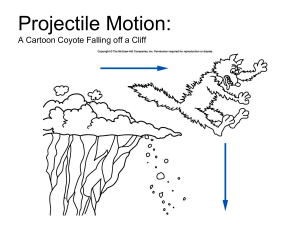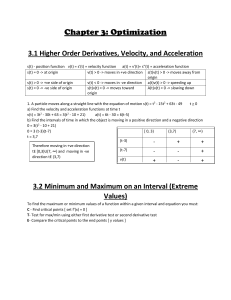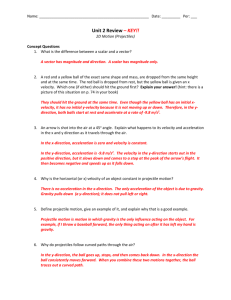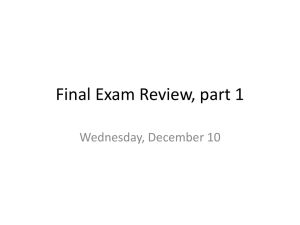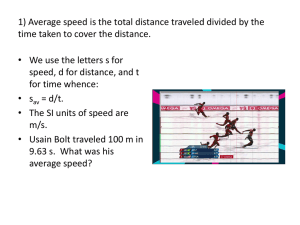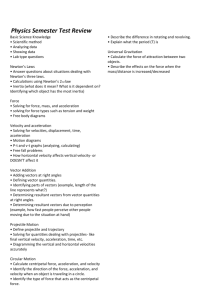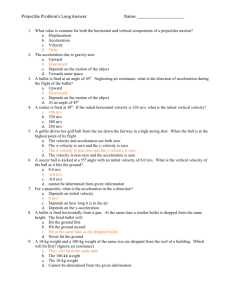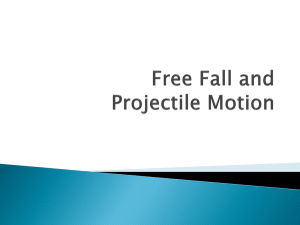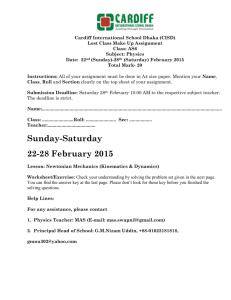fall final review II
advertisement
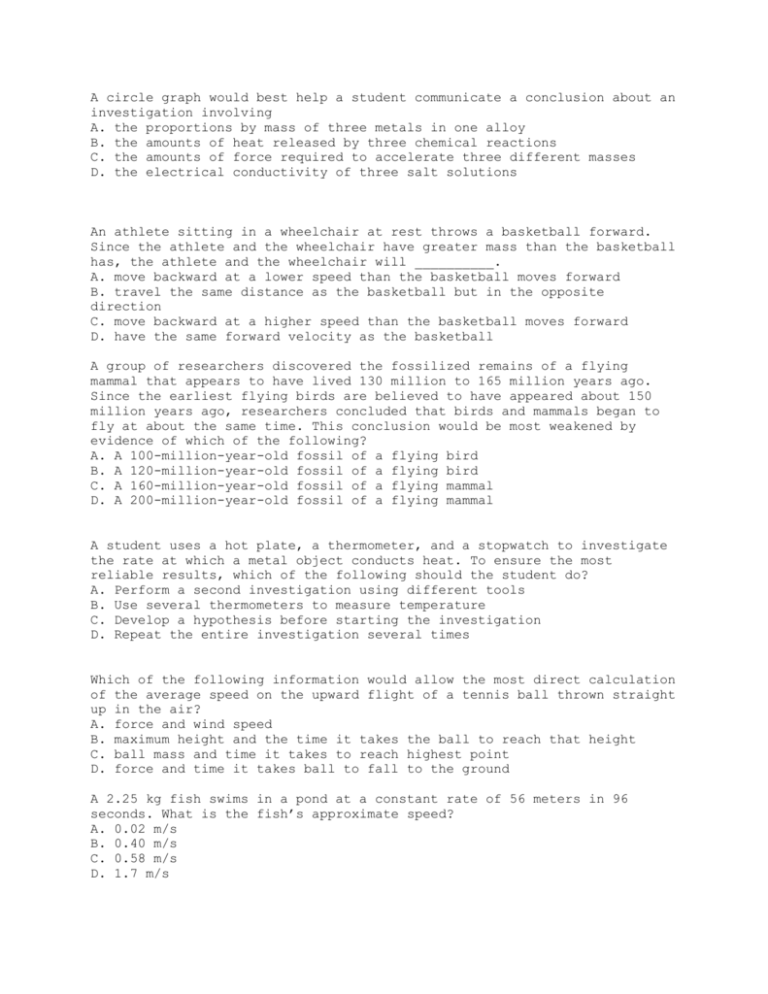
A circle graph would best help a student communicate a conclusion about an investigation involving A. the proportions by mass of three metals in one alloy B. the amounts of heat released by three chemical reactions C. the amounts of force required to accelerate three different masses D. the electrical conductivity of three salt solutions An athlete sitting in a wheelchair at rest throws a basketball forward. Since the athlete and the wheelchair have greater mass than the basketball has, the athlete and the wheelchair will __________. A. move backward at a lower speed than the basketball moves forward B. travel the same distance as the basketball but in the opposite direction C. move backward at a higher speed than the basketball moves forward D. have the same forward velocity as the basketball A group of researchers discovered the fossilized remains of a flying mammal that appears to have lived 130 million to 165 million years ago. Since the earliest flying birds are believed to have appeared about 150 million years ago, researchers concluded that birds and mammals began to fly at about the same time. This conclusion would be most weakened by evidence of which of the following? A. A 100-million-year-old fossil of a flying bird B. A 120-million-year-old fossil of a flying bird C. A 160-million-year-old fossil of a flying mammal D. A 200-million-year-old fossil of a flying mammal A student uses a hot plate, a thermometer, and a stopwatch to investigate the rate at which a metal object conducts heat. To ensure the most reliable results, which of the following should the student do? A. Perform a second investigation using different tools B. Use several thermometers to measure temperature C. Develop a hypothesis before starting the investigation D. Repeat the entire investigation several times Which of the following information would allow the most direct calculation of the average speed on the upward flight of a tennis ball thrown straight up in the air? A. force and wind speed B. maximum height and the time it takes the ball to reach that height C. ball mass and time it takes to reach highest point D. force and time it takes ball to fall to the ground A 2.25 kg fish swims in a pond at a constant rate of 56 meters in 96 seconds. What is the fish’s approximate speed? A. 0.02 m/s B. 0.40 m/s C. 0.58 m/s D. 1.7 m/s A child jumps on a trampoline, as shown above. Which of the following causes the child to rise in the air? A. mass B. inertia C. reaction force D. gravitational force ANSWER: When the air is released from a balloon, the air moves in one direction, and the balloon moves in another direction. Which statement does this situation best illustrate? A. What goes up must come down. B. For every action there is an equal and opposite reaction. C. The shape and size of an object affect air resistance. D. The acceleration due to Earth’s gravity is 9.8 m/s 2. ANSWER: John has A. about B. about C. about D. about ANSWER: a mass of 90 kg. 900 N 90 N 9 N 9.8 N Calculate John's weight. A student investigates the effects of five brands of fertilizer on plant growth and concludes that Brand X works best. Which of the following would best communicate this conclusion? A. A list of the ingredients in each brand of fertilizer used B. A graph showing the growth rate of plants grown with the different fertilizers C. A description of the role of different nutrients in plant growth D. A diagram showing the conditions in which each plant grew ANSWER: What is the net force exerted on a 90.0 kg race-car driver while the race car is accelerating from 0 to 44.7 m/s in 4.50 s? A. 9.8 N B. 20 N C. 201 N D. 894 N ANSWER: Which of the following free body diagrams represents a car accelerating to the right? A. A B. B C. C ANSWER: Which of the following free body diagrams represents an object in equilibrium? A. B. C. ANSWER: If an object has a net force of zero, it A. may be at rest or moving at a constant velocity. B. must be at rest. C. may be accelerating. D. must be decelerating. ANSWER: Billy hiked 5 km east of his campsite and then 5 km north of his campsite. What is his displacement? A. 7.1 km northeast B. 50.0 km southwest C. 10 km north D. 5 km northeast ANSWER: Ronnie has a weight of 500 N. Calculate Ronnie's mass. A. about 30 kg B. 500 N C. 500 kg D. about 50 kg ANSWER: A 2-kg bucket hangs from a rope. A. exactly 9.8 N B. 9.8 m/s2 C. about 20 N D. none of the above ANSWER: Calculate the tension on the rope. A bowling ball rolls off of the empire state building. Ignoring air resistance, the vertical velocity after the ball has been falling for three seconds is about __________. A. -98 m/s B. -30 m/s C. 9.8 m/s2 D. depends on the mass ANSWER: A little boy pulls a wagon with his dog in it. The mass of the dog and wagon together is 45 kg. The wagon accelerates at 0.85 m/s2. What force is the boy pulling with? A. 45 N B. 85 N C. 38 N D. none of the above ANSWER: When adding vectors, the length of the vector represents A. the direction of the vector quantity B. the magnitude of the vector quantity C. the magnitude and direction of the vector quantity ANSWER: A 68 kg runner exerts a force of 59 N. What is the acceleration of the runner? A. 0.87 m/s2 B. 1.2 m/s2 C. 10 m/s2 D. none of the above ANSWER: Which of the following diagrams illustrates the horizontal and vertical velocities of a projectile correctly? A. A B. B C. C ANSWER: B Which of the following statements are NOT true about a projectile? A. A projectile has a vertical acceleration. B. A projectile acts under the influence of gravity. C. A projectile must be traveling downward. D. A projectile's path is called its trajectory. ANSWER: Inertia can best be described as _____. A. the force that keeps moving objects moving and stationary objects at rest. B. the willingness of an object to eventually lose its motion C. the force that causes all objects to stop D. the tendency of any object to resist change and keep doing whatever it's doing ANSWER: Inertia is dependent on A. speed B. acceleration C. force D. mass ANSWER: Which of the A. 2-kg ball B. 4-kg ball C. 1-kg ball D. 5-kg ball ANSWER: following objects have the greatest inertia? rolling 3 m/s rolling 1 m/s at rest at rest Use the following graph, which shows the motion of a car, to answer the following question: Calculate the average velocity of the car between 0 s and 10 s. A. 60 m/s B. 10 m/s C. 6 m/s D. none of the above ANSWER: Use the following graph, which shows the motion of a car, to answer the following question: During which interval does the car come to a stop? A. at 0 s B. 10-15 s C. 30-55 s D. none of the above ANSWER: Use the following graph, which shows the motion of a car, to answer the following question: During which interval does the car experience largest velocity? A. 0-10 s B. 10-15 s C. 15-30 s D. 40-55 s ANSWER: Use the following shows the motion of a car, to answer the following question: Which of the following motion diagrams represents the car in the first 10 seconds? A. a B. b C. c D. d ANSWER: On a velocity-time graph, a constant velocity is shown by A. a constant positive slope B. a constant negative slope C. a large slope D. no slope at all ANSWER: On a __________ the slope of the line represents the average velocity. A. position-time graph B. velocity-time graph C. acceleration-time graph D. all of the above ANSWER: A cannonball is shot off of a cliff horizontally at 20 m/s and lands at the base of the cliff 3 seconds later. How far from the base of the cliff does the cannonball land? A. 20 m B. 10 m C. 60 m D. 6.3 m ANSWER: As Ed sits on a bus that is traveling east 8 m/s, John walks up the aisle toward the driver at 2 m/s. Sally walks toward the back of the bus at 3 m/s. Andy stands outside on the sidewalk, watching the bus go by. How fast does Ed perceive John moving? A. 6 m/s B. 10 m/s C. 2 m/s D. 8 m/s ANSWER: As Ed sits on a bus that is traveling east 8 m/s, John walks up the aisle toward the driver at 2 m/s. Sally walks toward the back of the bus at 3 m/s. Andy stands outside on the sidewalk, watching the bus go by. How fast does Andy perceive John moving? A. 10 m/s B. 6 m/s C. 2 m/s D. 3 m/s ANSWER: As Ed sits on a bus that is traveling east 8 m/s, John walks up the aisle toward the driver at 2 m/s. Sally walks toward the back of the bus at 3 m/s. Andy stands outside on the sidewalk, watching the bus go by. How fast does Ed perceive Sally moving? A. 11 m/s B. 5 m/s C. 3 m/s D. 8 m/s ANSWER: As Ed sits on a bus that is traveling east 8 m/s, John walks up the aisle toward the driver at 2 m/s. Sally walks toward the back of the bus at 3 m/s. Andy stands outside on the sidewalk, watching the bus go by. How fast does Andy perceive Ed moving? A. 8 m/s B. 0 m/s C. 2 m/s D. 3 m/s ANSWER: A lizard accelerates from 2 m/s to 10 m/s in 4 seconds. lizard’s average acceleration? A. 10 m/s2 B. 8 m/s C. 4 s What is the D. 2 m/s2 ANSWER: Mary drives 300 miles at an average speed of 65 miles/hour. About how many minutes did it take her to get to her destination? A. 4.6 minutes B. 277 minutes C. 19,500 minutes D. none of the above ANSWER: If a Ferrari, with an initial velocity of 10 m/s, accelerates at a rate of 50 m/s/s for 3 seconds, what will its final velocity be? A. 160 m/s B. 150 m/s C. 60 m/s D. none of the above ANSWER: If Rock A of 1 kg, and Rock B of 2 kg, are both dropped from 20 feet high, which will land first? A. Rock A B. Rock B C. They will land at the same time. ANSWER: Garrett runs a distance of 3 miles in 25 minutes. What is his average speed? A. 8.3 miles/min B. 75 miles/min C. 0.12 miles/min D. 9.8 miles/min ANSWER: If a quarter is flicked horizontally off of a desk at the same time another quarter is dropped from the same height, which quarter will land first? A. The quarter that is flicked will land first. B. The quarter that is dropped will land first. C. Both quarters will land at the same time. ANSWER: Mrs. Fanny is trying to push a very heavy basket at Wall-mart. In order to get the most out of the force she is applying, at which angle should she apply her force? A. A B. B C. C D. D ANSWER: Ignoring air resistance, as a projectile moves along it path, the net horizontal acceleration is A. zero. B. equal to the force that launched it. C. 9.8 N. D. 9.8 m/s2. ANSWER: If you apply a horizontal 40-N force to a 400-kg crate and friction applies a 20-N force against you, what is the acceleration of the crate? A. 6.7 m/s2 B. 20 m/s2 C. 60 N D. 0.05 m/s2 ANSWER: Ignoring air resistance, as a projectile moves along it path, the net vertical acceleration is A. zero. B. equal to the force that launched it. C. 9.8 N. D. 9.8 m/s2. ANSWER: As Mattie is driving down the highway at a speed of 27 m/s, a car pulls out in front of her. She slams on her brakes slowing down to 10 m/s in 1.2 seconds. Calculate her acceleration. A. 14 m/s2 B. -14 m/s2 C. 14 m/s D. -14 m/s ANSWER: According to Newton's second law, a bus is harder to push than a bike because A. it has more weight. B. it has more mass. C. it encounters more friction. D. it has an equal and opposite reaction to your force. ANSWER: If a tennis ball is thrown and caught from the same height with a flight time of 6 seconds, about how high did it rise? A. 30 m B. 45 m C. 60 m D. 90 m ANSWER: A 0.5-kg ball is tied to a 0.25-m string and swing in a circle. If it takes 0.2 s for the ball to go around one time, what is the centripetal acceleration? A. 247 m/s2 B. 49 m/s2 C. 79 m/s2 D. 205 m/s2 ANSWER: In what direction is the force acting on the cart in the diagram above? A. toward the center B. outward C. toward the right D. toward the left ANSWER: The moon revolves around the earth. What type of force is acting as the centripetal force that causes the moon to follow its curved path? A. tension B. gravitational C. thrust D. friction ANSWER: In what direction is the acceleration in the diagram above? A. toward the center B. outward C. toward the right D. toward the left ANSWER: A rock is tied to a string and swung in a circle. If the string were to break, in what direction would the rock fly? A. toward the center B. outward C. it would still continue in the circular path D. straight line path tangent to the circle ANSWER: What happens to the force of attraction between two objects if the distance between the objects increases? A. the force increases B. the force decreases C. the force stays the same ANSWER: Two bowling balls each have a mass of 7.2 kg. They are located next to each other with their centers 0.4 m apart. What gravitational force do they exert on each other? A. 4.1 x 10-5 N B. 2.2 x 10-8 N C. 3.4 x 10-2 N D. 7.1 x 10-12 N ANSWER: What happens to the force of attraction between two objects if the mass of one of the objects decreases? A. the force increases B. the force decreases C. the force stays the same
